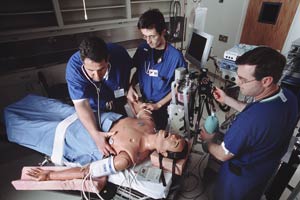Residency (medicine) facts for kids
When someone wants to become a doctor, they first go to medical school and earn a medical degree. But that's not the end of their learning! After medical school, they enter a special training period called a residency. During residency, these new doctors, called resident physicians or just residents, work in hospitals. They treat real patients but always under the careful eye of more experienced doctors. It's like an apprenticeship for doctors, where they gain lots of hands-on experience.
Contents
What is a Medical Residency?
A medical residency is a very important part of becoming a fully qualified doctor. It's a time when doctors who have just finished medical school get practical training. They work in different parts of a hospital, like the emergency room or surgery. This helps them learn how to care for many types of patients.
Why Do Doctors Do Residency?
Doctors do residency to become experts in a specific area of medicine. For example, some residents might want to be heart doctors (cardiologists). Others might want to be brain doctors (neurologists). Residency lets them focus on their chosen field. They learn by doing, seeing many different cases and situations. This hands-on learning is key to becoming a skilled and confident doctor.
How Long Does Residency Last?
The length of a medical residency can be different. It depends on the type of medicine the doctor wants to practice. Some residencies might be as short as three years. Others, like surgery or brain surgery, can last five to seven years or even longer. During this time, residents work very hard. They often have long hours, but they learn a huge amount every day.
What Happens After Residency?
After a doctor finishes their residency, they are much more experienced. They are then ready to practice medicine on their own. Many doctors will then take special exams to become "board-certified." This means they are officially recognized as experts in their chosen medical field. Some doctors might even do more training, called a "fellowship," to become even more specialized.
Images for kids
 | Toni Morrison |
 | Barack Obama |
 | Martin Luther King Jr. |
 | Ralph Bunche |



